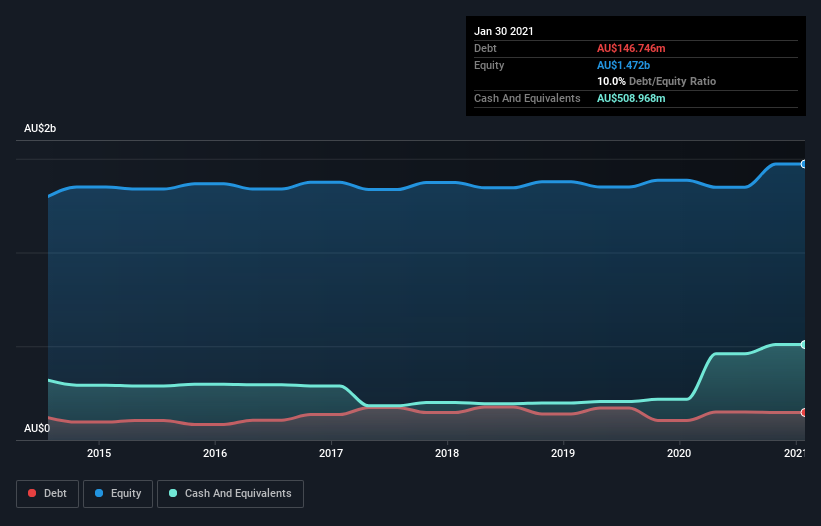- Australia
- /
- Specialty Stores
- /
- ASX:PMV
These 4 Measures Indicate That Premier Investments (ASX:PMV) Is Using Debt Safely

The external fund manager backed by Berkshire Hathaway's Charlie Munger, Li Lu, makes no bones about it when he says 'The biggest investment risk is not the volatility of prices, but whether you will suffer a permanent loss of capital.' It's only natural to consider a company's balance sheet when you examine how risky it is, since debt is often involved when a business collapses. We note that Premier Investments Limited (ASX:PMV) does have debt on its balance sheet. But should shareholders be worried about its use of debt?
What Risk Does Debt Bring?
Debt and other liabilities become risky for a business when it cannot easily fulfill those obligations, either with free cash flow or by raising capital at an attractive price. If things get really bad, the lenders can take control of the business. While that is not too common, we often do see indebted companies permanently diluting shareholders because lenders force them to raise capital at a distressed price. By replacing dilution, though, debt can be an extremely good tool for businesses that need capital to invest in growth at high rates of return. When we think about a company's use of debt, we first look at cash and debt together.
Check out our latest analysis for Premier Investments
What Is Premier Investments's Debt?
The image below, which you can click on for greater detail, shows that at January 2021 Premier Investments had debt of AU$146.7m, up from AU$103.8m in one year. However, it does have AU$509.0m in cash offsetting this, leading to net cash of AU$362.2m.

How Healthy Is Premier Investments' Balance Sheet?
Zooming in on the latest balance sheet data, we can see that Premier Investments had liabilities of AU$522.2m due within 12 months and liabilities of AU$252.8m due beyond that. Offsetting these obligations, it had cash of AU$509.0m as well as receivables valued at AU$10.9m due within 12 months. So its liabilities outweigh the sum of its cash and (near-term) receivables by AU$255.1m.
Given Premier Investments has a market capitalization of AU$4.30b, it's hard to believe these liabilities pose much threat. Having said that, it's clear that we should continue to monitor its balance sheet, lest it change for the worse. While it does have liabilities worth noting, Premier Investments also has more cash than debt, so we're pretty confident it can manage its debt safely.
In addition to that, we're happy to report that Premier Investments has boosted its EBIT by 68%, thus reducing the spectre of future debt repayments. When analysing debt levels, the balance sheet is the obvious place to start. But it is future earnings, more than anything, that will determine Premier Investments's ability to maintain a healthy balance sheet going forward. So if you're focused on the future you can check out this free report showing analyst profit forecasts.
Finally, while the tax-man may adore accounting profits, lenders only accept cold hard cash. Premier Investments may have net cash on the balance sheet, but it is still interesting to look at how well the business converts its earnings before interest and tax (EBIT) to free cash flow, because that will influence both its need for, and its capacity to manage debt. Over the last three years, Premier Investments actually produced more free cash flow than EBIT. That sort of strong cash conversion gets us as excited as the crowd when the beat drops at a Daft Punk concert.
Summing up
While it is always sensible to look at a company's total liabilities, it is very reassuring that Premier Investments has AU$362.2m in net cash. The cherry on top was that in converted 127% of that EBIT to free cash flow, bringing in AU$492m. So we don't think Premier Investments's use of debt is risky. There's no doubt that we learn most about debt from the balance sheet. However, not all investment risk resides within the balance sheet - far from it. These risks can be hard to spot. Every company has them, and we've spotted 2 warning signs for Premier Investments (of which 1 makes us a bit uncomfortable!) you should know about.
At the end of the day, it's often better to focus on companies that are free from net debt. You can access our special list of such companies (all with a track record of profit growth). It's free.
If you decide to trade Premier Investments, use the lowest-cost* platform that is rated #1 Overall by Barron’s, Interactive Brokers. Trade stocks, options, futures, forex, bonds and funds on 135 markets, all from a single integrated account. Promoted
New: Manage All Your Stock Portfolios in One Place
We've created the ultimate portfolio companion for stock investors, and it's free.
• Connect an unlimited number of Portfolios and see your total in one currency
• Be alerted to new Warning Signs or Risks via email or mobile
• Track the Fair Value of your stocks
This article by Simply Wall St is general in nature. It does not constitute a recommendation to buy or sell any stock, and does not take account of your objectives, or your financial situation. We aim to bring you long-term focused analysis driven by fundamental data. Note that our analysis may not factor in the latest price-sensitive company announcements or qualitative material. Simply Wall St has no position in any stocks mentioned.
*Interactive Brokers Rated Lowest Cost Broker by StockBrokers.com Annual Online Review 2020
Have feedback on this article? Concerned about the content? Get in touch with us directly. Alternatively, email editorial-team (at) simplywallst.com.
About ASX:PMV
Premier Investments
Operates various specialty retail fashion chains in Australia, New Zealand, Asia, and Europe.
Flawless balance sheet 6 star dividend payer.
Similar Companies
Market Insights
Community Narratives




